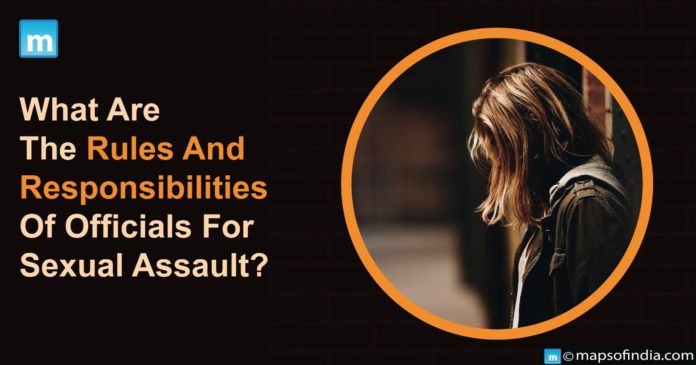Sexual harassment is still a severe and pervasive issue across almost all industry sectors and workplaces, despite decades of attention, legal action, and advocacy, according to this analysis of data, research, and experience. No industry is immune to sexual harassment or unaffected by its effects.
Sexual Assault Rules And Responsibilities
It is crucial to take action to stop the threat of sexual violence. Failing to take the necessary precautions in sexual assault causes suffering for the victim. The procedure when receiving a sexual assault complaint is outlined in specific directives incorporated in Delhi Police Standing Orders and Circulars.
Summarized Version of Rules and Responsibilities of Officials
- The D.O. ensures that a call providing information on sexual assault is reported to a Woman Officer.
- The I.O. must ask the victim if they need a counsel at State expense, ensure that the victim is medically examined at the earliest, and request the Forensic Science Laboratory (FSL) to deal with the case on a priority basis. They must also solicit information, such as the name and contact number of the victim, details of their parent(s) and other family members with whom there has been regular contact,
- Finally, they must complete the investigation at the earliest and ensure that in no case a person accused of a sexual offence gets bail.
- The SHO must immediately inform the Delhi State Legal Services Authority and assist the DSLSA in the rehabilitation/compensation process. If a Counsellor refuses to help or causes uncalled-for delay, the RCC and DCW should be informed.
- The important details are that a detailed description of the assault/abuse history should be included in the MLC of the victim and that the help of a psychologist should be provided to a child victim.
- If the victim is below 12, consent must be obtained from their parent/another person of trust, and if they refuse, they must be examined.
- Pseudonyms should be used to protect the identity of the prosecutrix/victim, even if the accused person is a juvenile.
- Counsellors should not be cited as prosecution witnesses or included in the documents forwarded to the Court. Any action required after filing the main chargesheet should be mentioned.
- A list of advocates should be kept at the police station for victims who do not have a lawyer. An e-Challan (chargesheet) should be prepared and filed in the Court immediately. If the case is registered on charges of rape, it should be ensured that the identity of the prosecutrix/victim is not revealed to the public.
- The Rape Crisis Cell (RCC) provides legal assistance to the victim(s) and their families in cases of sexual assault. It operates with the help of lawyers and Crisis Intervention Centres (CICs).
- The Delhi State Legal Services Authority (DSLSA) is the competent authority to protect the victim(s), family members, and prosecution witnesses.
- Police should respond to sexual assault complaints, and disciplinary action is present against erring officials.




